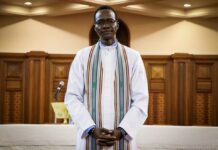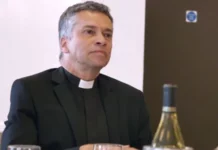Primate accepts findings about Church’s institutional, systemic and personal failings over child sexual abuse
[Anglican Media Melbourne] The Royal Commission into Institutional Responses to Child Sexual Abuse has found that the cumulative effect of a number of systemic issues in the Anglican Diocese of Newcastle allowed a group of perpetrators to operate within the Church there for at least 30 years.
In its 404-page report, the Royal Commission found that Newcastle Bishops Alfred Holland (1978-92) and Roger Herft (1993-2005), later Archbishop of Perth, showed a distinct lack of leadership, and that alleged perpetrators were not called to account.
It said there was a “do nothing” approach in the diocese in response to child sexual abuse allegations during Bishop Holland’s episcopate, while Bishop Herft’s response to allegations of child sexual abuse was “weak and ineffectual” and showed no regard for the need to protect children.
But the report praised their successors, Bishop Brian Farran (2005-12) and Bishop Greg Thompson (2014-17), saying that they took appropriate responses against alleged perpetrators and provided survivors with pastoral care.
The Anglican Primate of Australia, Melbourne’s Archbishop Philip Freier, issued a statement after the report’s release, saying Anglicans, like other Australians, had been shocked and dismayed as the Royal Commission uncovered events in the Newcastle diocese.
“We accept the Royal Commission’s findings about our failures, institutional, systemic and personal,” Dr Freier said. “We are grateful for its work in identifying weaknesses and areas for improvement.
“I apologise again on behalf of the Anglican Church to survivors, their families, and other people affected by the criminal offences and our failure to react properly.
“The Anglican Church of Australia has taken strong actions to improve our protocols, procedures, checks, and responses to complaints, many of these in response to Royal Commission recommendations. We continue to strive to ensure that the Church is a safe place for all, and especially for children.”
A redacted version of the Royal Commission’s report into its Case Study 42, The responses of the Anglican Diocese of Newcastle to instances and allegations of child sexual abuse, was released on 7 December – only eight days before the Commission delivers its multi-volume final report to Governor-General Sir Peter Cosgrove, ending a five-year inquiry.
A summary of the report, with a link to the full document, may be read at https://www.childabuseroyalcommission.gov.au/media-releases/report-anglican-diocese-newcastle-released.
It was the third major case study report published in consecutive days, the previous two being into the Roman Catholic Archdiocese of Melbourne and into the Christian Brothers and Roman Catholic diocesan authorities in Ballarat.
All three were redacted, with the Royal Commission noting that its Terms of Reference require that its work not prejudice current or future criminal or civil proceedings.
“For this reason, Commissioners recommended that at this time a redacted version of the report be tabled and published,” a Royal Commission media release accompanying the report said. “It is expected that an unredacted version of the report will be tabled and published at a later date.”
The Newcastle Anglican report followed a public hearing held in August 2016 in Newcastle and in November last year in Sydney. The hearing was chaired by Justice Peter McClellan, the Royal Commission’s Chair and a NSW Judge of Appeal, with two of the other five Royal Commissioners – former Queensland police commissioner Bob Atkinson and Robert Fitzgerald, a member of the Productivity Commission – on the panel.
“We accept the evidence of Bishop Thompson that, when he was around 19 years of age in 1976 and considering a vocation in the Church, he was befriended by Canon Eric Barker, then a senior member of the Diocese,” the Commissioners wrote. “Canon Barker made sexual advances to Mr Thompson, which he rebuffed. Canon Barker told Mr Thompson, ‘[i]f you want to get into the ministry, we have to have a relationship’.
“Canon Barker introduced Mr Thompson to Bishop Shevill (Bishop Ian Shevill, who led the Newcastle diocese from 1973-77), and the three of them went to the movies one night. During the movie, both Canon Barker and Bishop Shevill groped Mr Thompson in the genital area.”
The report said the failure of Bishop Holland to act in the face of the allegations made to him represented a lost opportunity to prevent further abuse being perpetrated by Father Peter Rushton and Father James Brown.
Father Rushton died in 2007 and was never charged with any child sexual abuse offences, although the diocese acknowledges that he was a child sex offender. In 2011, Father Brown pleaded guilty to 27 charges of child sexual abuse relating to 19 male victims and was convicted and sentenced to a maximum of 20 years in jail.
“There was a ‘do nothing’ approach in the Diocese in response to child sexual abuse allegations during Bishop Holland’s episcopate,” it said.
The report said paedophilia generally, and paedophilia within the Anglican Church in particular, was a live issue during Bishop Herft’s episcopate in Newcastle but that when he assumed his appointment, he received no notification of any allegations of child sexual abuse made against members of the clergy or lay people associated with the Diocese.
“Bishop Herft gave evidence that from 1993 he understood ‘that any matters of child abuse should be reported to the police’. However, he understood his obligation to report child sexual abuse allegations arose only when he had received a ‘complaint of some substance’. He said that during his time as Bishop of Newcastle he did not consider he owed an obligation to report allegations of child sexual abuse to the police unless he knew the name of the complainant.
“Bishop Herft also gave evidence that before 2002, if someone made an allegation of child sexual abuse and would not put the allegation in writing, the Diocese would take no further action.
“In hindsight, he accepted that this left children at risk and was ‘totally unacceptable’.”
The report said there was a substantial failure in risk management during Bishop Herft’s episcopate, which left children at risk. The way in which the Diocese handled allegations of child sexual abuse showed there was a large gap between the Diocese’s policies and its practices, particularly during the earlier years of Bishop Herft’s episcopate.
“We accept that there were significant developments in the policies for handling sexual abuse allegations during Bishop Herft’s tenure in the Diocese. However, particularly in the early years of Bishop Herft’s episcopate, these were not well adapted to handling allegations of child sexual abuse.
“Bishop Herft gave evidence that it was always the policy of the Diocese to report allegations of child sexual abuse to the police; however, this policy was fettered in many respects. Very few allegations of child sexual abuse that police were not already aware of were reported to the police during Bishop Herft’s tenure.
“His response was weak and ineffectual and showed no regard for the need to protect children from the risk that they could be preyed upon. It was a failure of leadership.”
The report said that upon becoming Bishop of Newcastle, Bishop Farran gradually became aware of the scope of the problem with child sexual abuse in the diocese. He took steps in relation to the allegations of which he was made aware and adopted a proactive approach in managing them.
“He also provided care and pastoral assistance to survivors. For this, he experienced a considerable backlash.
“Mr Michael Elliott, the professional standards director, and Mr (John) Cleary, the diocesan business manager, provided support to survivors of child sexual abuse and assisted them with their claims of redress against the Diocese. Mr Michael Elliott played an instrumental role in uncovering the extent of the problem of child sexual abuse within the Diocese.”
The Royal Commissioners also praised Bishop Peter Stuart, who has served as Assistant Bishop to Bishops Farran and Thompson and twice as Administrator, before being elected recently as 14th Bishop of Newcastle.
“We are satisfied that, during Assistant Bishop Stuart’s administration of the Diocese between December 2012 and February 2014, Assistant Bishop Stuart progressed matters relating to child protection, including by making appropriate disclosures to the police, developing the child protection policy framework, enhancing the redress framework and implementing a binding risk management policy. We are also satisfied that he was assisted and well supported by Mr Cleary and Mr Michael Elliott in achieving these ends.”
The report said that Bishop Thompson had been aware of child sexual abuse in the diocese that had been reported in the media when he took up his appointment in Newcastle in 2014, but he had no idea of the magnitude of the problem. Professional standards director Mr Michael Elliott had identified 30 separate perpetrators in the diocese.
“Bishop Thompson considered that there was a systemic problem of child sexual abuse in the Diocese over many decades,” the Royal Commissioners wrote. “We agree.
“On 25 October 2015, Bishop Thompson publicly disclosed his own story of sexual abuse in an article in the Newcastle Herald. This led to a considerable backlash by a group within the Diocese who were largely connected to the Cathedral.
“We are satisfied that, following Bishop Thompson’s public announcement of his alleged abuse at the hands of Bishop Shevill and another senior member of clergy in the 1970s, he experienced a backlash from sections within the Diocese, largely connected to the Cathedral. This backlash included the making of complaints about Bishop Thompson to the Royal Commission, the then Primate of the Church and the Metropolitan of the Anglican Diocese of Sydney. These actions were designed at least in part to discourage the Diocese from dealing with allegations of child sexual abuse within the Diocese.
“We are also satisfied that those who targeted Bishop Thompson failed to understand or respond appropriately to the sexual abuse of children.
“Bishop Thompson began his episcopate with little idea of the fractious attitudes in the Diocese towards child sexual abuse. He resigned three years later, having experienced first-hand the type of hostility felt by so many survivors before him.”
The report said Bishop Thompson’s experiences demonstrated how important a healthy, educated community dialogue on child sexual abuse matters was to an institution’s broader response to child sexual abuse.
“The early episcopates in the Church had few policies and procedures in relation to child sexual abuse. That is not the case now, and there are numerous policies and procedures in place to create a standard by which diocesan staff deal with complaints. However, formal policies are only as strong as the community that respects and implements them.”
The report found the diocese did not address conflicts of interest. There was a lack of awareness of, or policies on, avoiding conflicts of interest in responding to child sexual abuse matters.
Conflicts of interests often involved lawyers who held positions in the diocese and acted as legal representatives for those charged with child sex offences.
The report said the case study had provided the Royal Commission with insights into systemic issues relating to the institutional response of the Newcastle diocese to instances and allegations of child sexual abuse.
“Bishop Holland and Bishop Herft showed a distinct lack of leadership, and alleged perpetrators were not called to account,” it said. “Compassion and pastoral care was often not shown to survivors.
“On the other hand, later bishops, Bishop Farran and Bishop Thompson, met the challenge head on by exposing the allegations, taking appropriate responses against alleged perpetrators and providing survivors with pastoral care. They faced a considerable backlash for so doing.”
The report said Mrs Jean Sanders, who chaired the Committee for Allegations of Sexual Misconduct from 2001-04, Mr Cleary, Mr Elliott and Bishop Thompson stood out in particular for their dedication, determination and diligence in seeking to uncover the extent of child sexual abuse in the diocese and in the compassion and care they showed for survivors and their families.
Several systemic issues appeared to have been less prevalent since the successive appointments of Mr Cleary, Mr Elliott and Bishop Thompson between 2007 and 2014. Before this period, the Royal Commission identified historical systemic issues, including that those who reported allegations of child sexual abuse to senior clergy were treated as if they had fabricated the allegations and were sometimes threatened with legal action; that allegations of child sexual abuse and related offences were not consistently or regularly reported to the police; record-keeping about complaints was inadequate; there was a lack of awareness of, or policies on, avoiding conflicts of interest in responding to child sexual abuse matters; there was a lack of turnover of those in positions of governance within the Diocese, “leading to entrenched positions, conflicts of interest and a narrowed pool of expertise”; permissive and timid leadership by successive bishops; and an over-reliance on the perceived honesty of alleged perpetrators when confronted with allegations.
“We also identified a number of systemic issues which are both historical and current and apply more broadly than to the diocesan hierarchy alone. As evident from the backlash among an element of Church members towards Bishop Farran and Bishop Thompson, the Diocese is an institution where some lay members hold significant influence.
“These historical and contemporary systemic issues are as follows: a minimising of the nature and impact of the offending; a reluctance among some clergy to implement risk management strategies for accused or convicted clergy where those clergy shared longstanding professional or personal relationships; a focus on protecting the reputation of the Church and of individual members of the Church, particularly those in positions of power and influence; (and) a misrepresentation of abusive and predatory sexual relationships as consensual homosexual relationships.
“A cumulative effect of each of these systemic issues was that a group of perpetrators was allowed to operate within the Diocese for at least 30 years.”
The report also referred to St John’s Theological College in Morpeth (“Morpeth College”), which the diocese operated from 1926 to 2007.
“… There is insufficient evidence before us to conclude that any aspect of the culture at Morpeth College, including its particular Anglo-Catholic persuasion or the fact that some students engaged in homosexual activity, was in any way linked to the number of child sex offenders or alleged offenders who studied at Morpeth College,” it said.
This was the third case study relating to an Anglican Diocese. The first was Case Study 3 on the Anglican Diocese of Grafton’s response to child sexual abuse at the North Coast Children’s Home at Lismore (see https://www.childabuseroyalcommission.gov.au/case-studies/case-study-03-north-coast-childrens-home) and the second was Case Study 36 on the response of the Church of England Boys’ Society and the Anglican Dioceses of Tasmania, Adelaide, Brisbane and Sydney to allegations of child sexual abuse (https://www.childabuseroyalcommission.gov.au/case-studies/case-study-36-church-england-boys-society).
The Royal Commission has also held public hearings concerning independent schools in the Anglican tradition, including Case Study 32 on the experiences of former students of Geelong Grammar School (see https://www.childabuseroyalcommission.gov.au/case-studies/case-study-32-geelong-grammar-school).
* Former Anglican Dean of Newcastle Graeme Russell Lawrence appeared in Newcastle Local Court on 7 December, pleading not guilty to sexually assaulting a 15-year-old boy in 1991.
Mr Lawrence, who was defrocked by the Anglican Church in 2012, is charged with four counts of aggravated sexual assault and aggravated indecent assault.
His arrest in November followed a referral from the Royal Commission last year.
The matter was adjourned until 14 February 2018 and his bail was continued.



